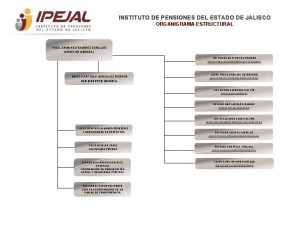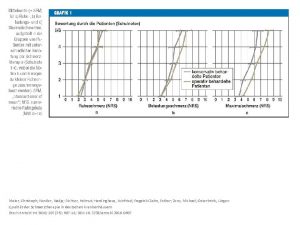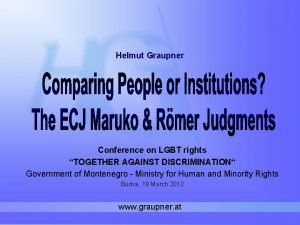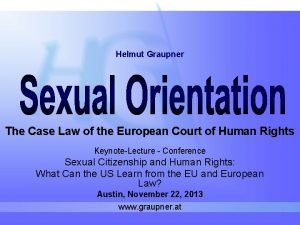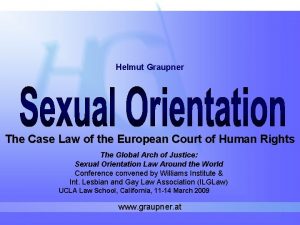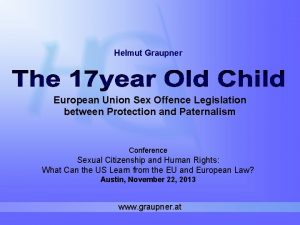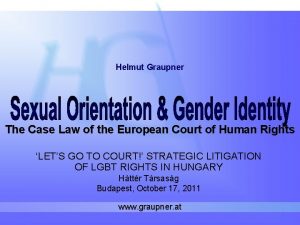Helmut Graupner Legal Recognition of SameSex Relationships National


























- Slides: 26

Helmut Graupner Legal Recognition of Same-Sex Relationships National, cross-border and European perspectives Academy of European Law Trier, 11 -12 April 2011 www. graupner. at

I. Human Rights Background II. Pre-Maruko ECJ-Case-Law III. The Case Tadao Maruko IV. The Reaction of German High Courts V. The Solution VI. The Case Jürgen Römer www. graupner. at

I. European Court of Human Rights: • Very essence of the convention is respect for human dignity and freedom • Notion of personal autonomy is an important principle underlying the interpretation of the right to respect for private life • Sexuality and sexual life are at the core of the fundamental right to protection of private life. State intervention interferes with this right; and such interferences are justified only if demonstrably necessary to avert damage from others (pressing social need, proportionality) • Attitudes and moral convictions of a majority cannot justify interferences into the right to private life (or into other human rights) (Dudgeon vs. UK 1981, Norris vs. Ireland 1988, Modinos vs. Cyprus 1993, Laskey, Brown & Jaggard vs. UK 1997, Lustig-Prean & Beckett vs. UK 1999; Smith & Grady vs. UK 1999; A. D. T. vs. UK 2000, Christine Goodwin vs. UK 2002, I. vs. UK 2002, Fretté vs. France 2002, L. & V. v. Austria 2003, S. L. v. Austria 2003) www. graupner. at

• Discrimination on the basis of sexual orientation – is unacceptable – is as serious as discrimination on the ground of race, ethnic origin, religion and sex – differentiation requires particularly serious reasons (Lustig-Prean & Beckett vs. UK 1999; Smith & Grady vs. UK 1999; Salgueiro da Silva Mouta vs. Portugal 1999; L. & V. v. Austria 2003, S. L. v. Austria 2003, E. B. vs. France 2008; Kozak v. POL 2010; P. B. & J. S. v. A 2010; Schalk & Kopf v. A 2010; J. M. v. UK 2010; Kiyutin v. RUS 2011) www. graupner. at

• not just negative rights to freedom from state intervention but also • positive rights to (active) protection of these rights in relation to the state as well as in relation to other individuals • obligation of the state to act in case of intereference with the right to personal development and the right to establish and maintain relations with other human beings (Zehnalová & Zehnal vs. CZ 2002) www. graupner. at

II. Pre-Maruko ECJ-Case-Law (a) Grant vs. South West Trains 1998 (C-249/96) Female employee was denied social-benefits for her female partner, which benefits a male employee for his (unmarried) female partner did receive - no discrimination on the ground of sex (Art. 141 EC) (b) D. & Sweden v. Council 2001 (C-122, 125/99) No household-allowance for same-sex partner (registered in Sweden) of a Swedish employee of the Council, while employees with a married partner in the same situation received the allowance – Neither discrimination on the basis of sex nor on the basis of sexual orientation www. graupner. at

The EU-legislator reacted to both judgments: 1. Grant (1998) -> Dir 2000/78/EC 2. D. & Sweden (2001) -> Reg (EG, EURATOM) 723/2004 (Amendment of Staff Regulations): a. Ban of discrimination (Art. 1 d par. 1) b. Equal rights for registred partnerships as for marriage, if marriage is not available (Art. 1 d par. 1 & Appendix VII Art. 1 par. 2 lit. c)

III. Tadao Maruko gegen Versorgungsanstalt der deutschen Bühnen (Vdd. B) (C-267/06) Hans Hettinger: -> costume designer -> 45 years member of Vdd. B -> 45 years paid fees to Vdd. B as his heterosexual colleagues -> 13 years of partnership with Mr. Tadao Maruko -> 2001 registered their partnership -> died 2005 Vdd. B: -> survivors benefits only to married partners -> no pension to Tadao Maruko: -> legal action (Bayr. VG München M 3 K 05. 1595)

Bayr. VG: referral for a preliminary ruling 1. direct discrimination? 2. discrimination justified by recital 22? Recital 22: “This Directive is without prejudice to national laws on marital status and the benefits dependent thereon. ” Vdd. B & UK -> unequal treatment of married couples and registered couples are outside of the scope of the Directive (due to recital 22)

Tadao Maruko: 1. Direct discrimination (as referral to pregnancy is direct discrimination on the ground of sex): -> needs not be decided, as in any case 2. Indirect discrimination: -> not only in case of RP equivalent to marriage -> as long as marriage is forbidden for same-sex couples: criterion of marriage always is just „apparently neutral“ and puts homosexuals „at a particular disadvantage” (Art. 2 par. 2 lit. b) -> pay is made contingent upon a condition which same-sex couples never can fulfil -> as in K. B. (2004) (opposite-sex couples with post-operative transgender partner were not allowed to marry): the condition of marriage must be dropped for same-sex couples (as long as marriage is not available) -> Otherwise: little discrimination (in MS with marriageequivalent RP) outlawed, but big discrimination (in MS without such RP) not (despite same unequal treatment)

European Commission & Advocate General Dámaso Ruiz-Jarabo Colomer: -> no direct discrimination (no referral to sexual orientation) -> indirect discrimination & no justification visible -> but only: if RP is marriage-equivalent („substantially the same effects“) Problem of comparative parameters: Marriage-RP or opposite-sex couples vs. same-sex couples?

The Judgment (01. 04. 2008) • Recital 22: Recital 22 cannot affect the application of the Directive (par. 59 f) • Direct Discrimination -> if registered partners „in comparable situation“ as married partners (par. 70 -73) Art. 2 par. 1 lit. a Dir 2000/78/EC: “direct discrimination …where one person is treated less favourably than another … in a comparable situation, “ -> Justification only possible under Art. 4 Abs. 1 („genuine and determining occupational requirement“)

The „comparable situation“ (1) formally: determination is task of the national court (par. 72 f) (2) in substance: -> „Comparability“, not „Identity“ (par. 69) -> „so far as concerns that survivor’s benefit“ (par. 73) -> individual-concrete comparison with the „situation comparable to that of a spouse who is entitled to the survivor’s benefit provided for under the occupational pension scheme managed by the Vdd. B. “ (par. 73) -> criteria of the national court (par. 62, 69): (a) formally constituted for life (b) union of mutual support and assistance

-> ECJ does not object to these criteria and explicitly says : „The combined provisions of Articles 1 and 2 of Directive 2000/78 preclude legislation such as that at issue in the main proceedings …“ (emphasis added) -> Compare to the judgment in Palacios (2007): “The prohibition on any discrimination on grounds of age … must be interpreted as not precluding national legislation such as that at issue in the main proceedings, …, where …[follow criteria which the national court has to apply in determining compatibility with community law]” (emphasis added)

IV. The Reaction of German High Courts (decisions on family allowance for civil servants, § 40 Abs. 1 Nr. 1 BBes. G) Federal Administrative Court („Bundesverwaltungsgericht“) (2 C 33. 06, 15. 11. 2007): No comparability, as -> RP and marriage are not identical (differences for instance regarding social benefits for civil servants, in tax legislation and joint adoption) -> complete or general equalization was neither created nor intended by the legislator

Federal Constitutional Court („Bundesverfassungsgericht“) (2 Bv. R 1830/06 , 06. 05. 2008): No comparability, as -> no general statutory equalization (a) equalization was not the intention of the legislator (b) no blanket clause (c) special regulations with deviations from the law of marriage -> no complete equalization in the law of public sector employees (still differences in remuneration and pension-rights) -> spouses typically in need of alimony by partner; RP typically not -> irrelevant that civil law maintenance-obligations are identical (in marriage and RP)

Problem: • General equalization -> circular reasoning (if general equalization would have taken place , no inequality would exist, and question of discrimination would not arise) • equalization in social benefits for public sector employees -> circular reasoning (discrimination is justified with another discrimination) • Typical/non-typical need of alimony: -> general-abstract approach which contradicts the individualconcrete view of the ECJ -> family-allowance is not dependend upon a need of alimony (also childless civil servants receive it. Even if their married partner earns more then themselves)

• Case law of Bundesverwaltungs- and Bundesverfassungsgericht -> contradict ECJ in Maruko • Even if this view is not shared -> in any way not unreasonable -> obligation to refer to the ECJ (asking for the criteria for the test of comparability) • If situation of married and registered partners are not comparable -> then question of indirect discrimination (by referring to the exclusively heterosexual criterion “marriage”) -> obligation to refer to the ECJ

V. The Solution VG München 30. 10. 2008 -> awarded survivors pension to Mr. Maruko -> surviving RP and surviving married partners in a comparable situation, as (a) survivors benefits are substitutes for alimony and (b) alimony-duties are the same in RP and marriage

Federal Constitutional Court („Bundesverfassungsgericht“) (1 Bv. R 1164/07 , 07. 09) • rejects its own (and Federal Administrative Court’s) prior caselaw (par. 112) • strict scrutiny for distinctions based on sexual orientation (par. 85, 88) • “protection of marriage” alone no justification (Art. 100) • “promotion of the family” not restricted to married partners (par. 103) • number of children (2. 200) in RPs (13. 000) not “negligible” (par. 113) • “serious differences” (between marriage & RP) required (par. 93) • differences must be related to the social benefit in question and to its aim and purpose (par. 86, 100)

• assessment of differences not upon abstract considerations but upon concrete reality of life (par. 112, 114, 115) • no differences (par. 102, 111 -113): (a) unlimited legally binding union of mutual support and assistance (b) maintenance obligations (c) need for alimony • survivors benefits are substitutes for alimony (par. 116, 119) -> RP entitled to same survivor’s pension as married partners Maruko -> Vdd. B withdraw their appeal -> judgment of VG München final & Tadao Maruko gets survivors pension

VI. The Case Jürgen Römer New case Römer vs. City of Hamburg (C-147/08): -> higher retirement pension for employee with married partner then for employee with RP -> even if married partner has higher income then employee and they have no children -> even if RP is in need of alimony by the employee and they have to care for children -> will the ECJ specify or extend the Marukojudgment? -> Will it rule on indirect discrimination?

Advocate General Niilo Jääskinen (Opinion 15. Juli 2010) -> confirms interpretation of Maruko (as outlined above) -> marriage and family-law: competence of member-states -> if marriage excludes same-sex couples: employment benefits must not be restricted to opposite-sex couples, otherwise Direct Discrimination -> if legal position marriage-rp is comparable Indirect Discrimination -> (a) if legal position marriage-rp is not comparable, or (b) if no registration at all

-> protection of marriage and the family as such no valid justification for discrimination (par. 106 -111) -> neither if such protection is enshrined in a national constitution -> Union-law supersedes also national constitutional law -> prohibition of discrimination on the basis of sexual orientation is a general principle of Union law (par. 129133) -> prohibition of discrimination not restricted to periods after entry into force of Dir 2000/78/EC, but it takes full effect before this date -> equal treatment and compensation can be claimed back to the beginning of a certain discrimination

Delivery of Judgment 10 May 2011

www. graupner. at
 Helmut weldle
Helmut weldle Schauspieler helmut schmid
Schauspieler helmut schmid Enrique helmut meyer mercado
Enrique helmut meyer mercado Herzfelde
Herzfelde Helmut jungclaus
Helmut jungclaus Die hamletmaschine
Die hamletmaschine Helmut lotti sjukdom
Helmut lotti sjukdom Helmut satz
Helmut satz Helmut knaust
Helmut knaust Dr. et dr. vet. helmut bacowsky
Dr. et dr. vet. helmut bacowsky Justus liebig y helmut von helmont
Justus liebig y helmut von helmont Helmut plank
Helmut plank Helmut braun
Helmut braun Dislina
Dislina Christoph nestler
Christoph nestler Helmut eberl
Helmut eberl Helmut lotti kalinka
Helmut lotti kalinka Helmut lotti kalinka
Helmut lotti kalinka Helmut geiger frankfurt
Helmut geiger frankfurt Helmut krone
Helmut krone Helmut newton ehepartnerin
Helmut newton ehepartnerin Helmut-schmidt-universität
Helmut-schmidt-universität Helmut knaust
Helmut knaust National unification and the national state
National unification and the national state Wow employee recognition program
Wow employee recognition program Chapter 18 revenue recognition
Chapter 18 revenue recognition Four part processing model for word recognition
Four part processing model for word recognition


